
Europe and Central Asia – Regional Overview of Food Security and Nutrition 2023
Publication Series
Publications

Gender, agriculture and rural development in Albania
07/2016
The purpose of the Country Gender Assessment of Albania points out some of the major gender inequalities that need to be considered by policy makers and project managers according to available data, and identifies further research needs in a wide range of areas, including fisheries, forestry, local farmer’s cooperation, and women’s real contribution to GDP considering their overwhelming contribution as unpaid family farmers. 2016, 48 p.

National Gender Profile of Agriculture and Rural Livelihoods: Turkey
09/2016
The purpose of the National Gender Profile of Agricultural and Rural Livelihoods - Turkey is to contribute to the production of knowledge for better informed, targeted and gender sensitive actions in agriculture and rural development. This national profile points out some of the major gender inequalities that need to be considered by policy makers and project managers according to available data, and identifies further research needs. 2016, 72 p.
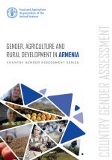
Gender, agriculture and rural development in Armenia
03/2017
The purpose of the Country Gender Assessment for Armenia is to contribute to the production of knowledge for better informed, targeted and gender sensitive actions in agriculture and rural development, serve as a tool for FAO, and raise public awareness. This Gender Assessment points out some of the major gender inequalities that need to be considered by policy makers and project managers according to available data, and identifies further research needs. 2017, 56 p.
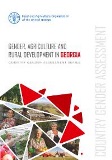
Gender, agriculture and rural development in Georgia
07/2018
This assessment highlights the challenges, gaps and practices in the area of gender and agriculture and rural development in Georgia. These include: the gap between policies, legislation and their implementation; the gender gap in earnings; the vertical and horizontal gender-based segregation in employment; the widespread of gender stereotypes; the rigid division of gender roles and decision-making at all levels, and other systemic issues. 2018, 86 p.
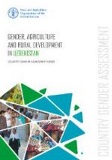
Gender, agriculture and rural development in Uzbekistan
06/2019
Gender equality is a key to eliminating poverty and hunger. The Country Gender Assessment for Uzbekistan can contribute to the production of knowledge for better informed, targeted and gender sensitive actions in agriculture and rural development. It has been produced in line with the FAO Policy on Gender Equality, and validated in a high-level national workshop with representatives from the government, civil society, international organizations, academia & ambassadors. 2019, 92 p.
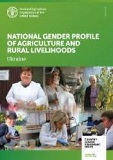
National gender profile of agriculture and rural livelihood - Ukraine, revised
06/2021
Gender equality is a key to eliminating poverty and hunger, as it has been demonstrated by the FAO throughout its research worldwide. As part of the FAO efforts on generating evidence and knowledge, and in compliance with the FAO Policy on Gender Equality, the purpose of the Country Gender Assessment for Ukraine is to contribute to the production of knowledge for better informed, targeted and gender sensitive actions in agriculture and rural development. 22/06/2021
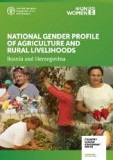
National gender profile of agriculture and rural livelihood - Bosnia and Herzegovina
09/2021
Despite the legal and policy foundation of BiH, gender considerations have only marginally been mainstreamed in state and entity policies on rural development or other sectors related to agriculture. At the state level, the Strategic Plan for Rural Development of Bosnia and Herzegovina (2018-2021) addresses support for women as a cross-cutting initiative but fails to fully mainstream gender. 2021, 94 p.
![cc2004en_200[1]](/images/reulibraries/default-album/cc2004en_200-1-.tmb-th600x450.jpg?Culture=en&sfvrsn=39af683d_2)
Ukraine: Humanitarian response update
09/2022
This document provides an up-to-date summary of the humanitarian situation in Ukraine and the response of the Food and Agriculture Organization of the United Nations (FAO) on the ground. The revised Rapid Response Plan (RRP) of FAO requires USD 115.4 million to assist 979 320 people in rural areas through December 2022. Furthermore, to address the grain storage crisis, FAO has developed a Grain Storage Support Strategy (GSSS), requiring an additional USD 65 million.
![cc1980en_200[1]](/images/reulibraries/default-album/cc1980en_200-1-.tmb-th600x450.jpg?Culture=en&sfvrsn=77824aba_2)
The European Inland Fisheries and Aquaculture Advisory Commission, 2022
06/2022
The European Inland Fisheries and Aquaculture Advisory Commission (EIFAAC) is a statutory body of the Food and Agriculture Organization (FAO) of the United Nations. EIFAAC serves as a network, linking policy-makers, managers, scientists and others working on inland fisheries and aquaculture. This brochure describes the work of EIFAAC, its networking, membership, the organization of EIFAAC symposia and sessions, its achievements, publications and ongoing projects.
